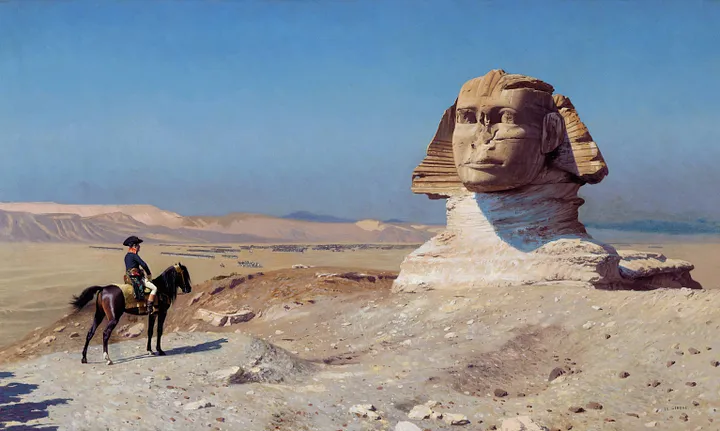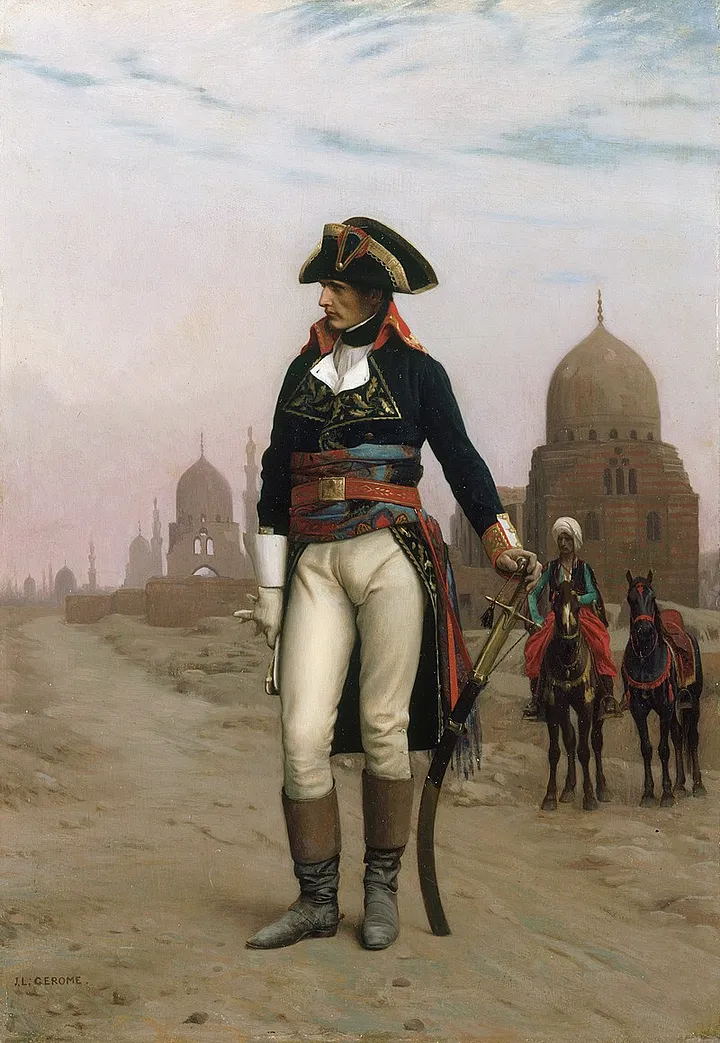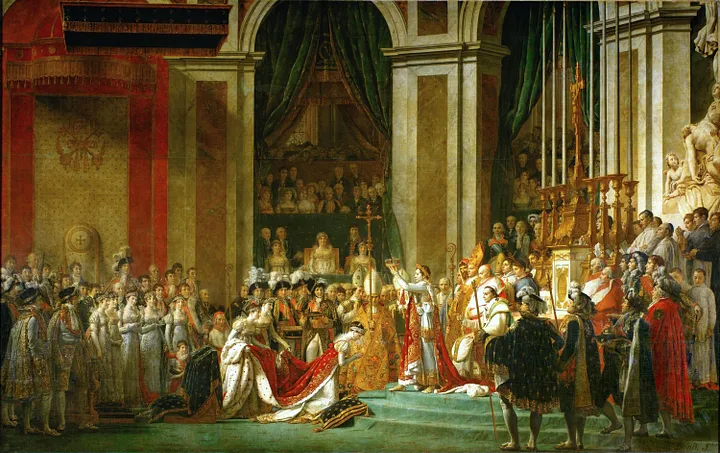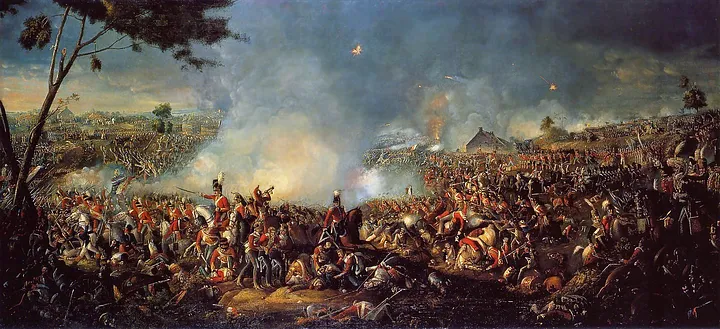Napoleon the Antichrist & the Christian Revival in Russia of 1812 (Part 2)

Napoleon Bonaparte and a Sphinx in Egypt
Here is part 1.Napoleon’s invasion of Egypt greatly alarmed the Orthodox Christian church. Many in the church saw the invasion as a fulfillment of Daniel 11:42, where the Antichrist is prophesied to invade and take Egypt. Daniel 11:42:
He shall stretch out his hand against the countries, and the land of Egypt shall not escape.

Napoleon in Egypt
The Orthodox church was also alarmed by the attempt made by Napoleon to create a Jewish state in Palestine. This regathering of the Jewish people in the Land of Israel would fulfill many Biblical prophecies that Jews spread out to the four corners of the world would once again reside in their homeland. An argument can be made that Napoleon’s intention in creating the Jewish state was for that very reason: fulfilling the prophets of the Bible:
Israelites, unique nation, whom, in thousands of years, lust of conquest and tyranny have been able to be deprived of their ancestral lands, but not of name and national existence!… Hasten! Now is the moment, which may not return for thousands of years, to claim the restoration of civic rights among the population of the universe which had been shamefully withheld from you for thousands of years, your political existence as a nation among the nations, and the unlimited natural right to worship Jehovah in accordance with your faith, publicly and most probably forever (JoeI 4:20).
By quoting from the Torah, rather than the Christian Bible, Napoleon appealed to Jews scattered throughout Europe. In the quote, one sees the depth of knowledge that Napoleon possessed of Christianity as well as Biblical prophecy. Napoleon did spend long lengths of time studying the bible and other religious texts. It was as if Napoleon was the man of whom Daniel the prophet had warned.
a king… understanding dark sentences
— Daniel 8:23

Napoleon Crowning himself Emperor
Napoleon also sought to re-institute the Jewish Sanhedrin and instituted reforms allowing Jews all over the European continent to practice their religion in freedom. This dramatically increased Napoleon’s standing with the Jews. So much so, that Theodor Herzl, considered the “father of the state of Israel”, praised Napoleon’s efforts over 100 years later.
Many other details remain in the life of Napoleon that give credit to the Church’s belief. Many of these reasons had weight to them, while other reasons such as Pierre Bezukhov’s numerical search in War and Peace, have been over analyzed. During this very interesting instance in the book, Pierre believes that he has identified Napoleon as the fulfillment of Revelation 13:18
Here is wisdom. Let him that hath understanding count the number of the beast: for it is the number of a man; and his number is Six hundred threescore and six.
By using French letters that correlate with a numerical system, Pierre calculated that Napoleon’s name is equivalent to the number of the beast: 666. With a little altering of his own name, Pierre realizes that his full name equals that same number. This leads him to believe that he is destined to be assassinate Napoleon. As the reader learns later in War and Peace, Pierre’s numerical calculations were not quite correct.
The life of Napoleon Bonaparte resembles the prophecies regarding the antichrist with spectacular clarity. A clarity that continued through the end of his very tumultuous life. We see the last portion of Napoleon’s life synonymous with that of the beast in Revelation 20:1–3.
Then I saw an angel coming down from heaven, having the key to the bottomless pit and a great chain in his hand. He laid hold of the dragon, that serpent of old, who is the Devil and Satan, and bound him for a thousand years; and he cast him into the bottomless pit, and shut him up, and set a seal on him, so that he should deceive the nations no more till the thousand years were finished. But after these things he must be released for a little while.
While the Beast of Revelation, the Antichrist, returned from the bottomless pit after 1000 years to make war against Christ and the saints, Napoleon returned to power after being exiled to the Island of Elba. After his famous “hundred days” Napoleon was ultimately defeated at the battle of Waterloo. He was then sent to the island of Saint Helena, where he ultimately died.

The Battle of Waterloo
Even at the death of this character, the Orthodox Christian church was not fully proved wrong in their belief that Napoleon was the antichrist. As we have seen, the life of Napoleon was very comparable to what the life of THE Antichrist will be. It is in the life of this historical figure that we are able to glimpse into the future. A future, in which a man, in many ways similar to Napoleon, will eventually rule the world. As the Orthodox church sounded the warnings during the years of Napoleon, so will the faithful church sound the call when the ultimate antichrist comes on the scene.
This dichotomy that we have touched on between the godless France and the Christianized Russia was best surmised during a scene in “War and Peace” on the eve of the Battle of Borodino. This battle, also known as the battle of Moscow, was a pivotal point in the war. In this scene Tolstoy portrays the self-centered Napoleon praising a portrait of his son, and being enamored in the glory of his heir. At the same moment, across the soon to be battlefield, General Kutuzov leads his men in a prayer towards heaven, asking that him and his men might be saved in the soon to occur battle. The reader is shown how the great General Kutuzov is not ashamed as he lays prostrate before his men during the prayer. In this scene is shown the vast differences in where the two leaders derive their strength, as well as their respective countries. Ultimately, the Christian God to whom Kutuzov implored came to the rescue of Russia. Just as God overcomes the beast and the multitude of nations at the end of time in the book of Revelation, so too did the ancient land of Russia overcome the French. The portent of the future “man of perdition” was overcome.